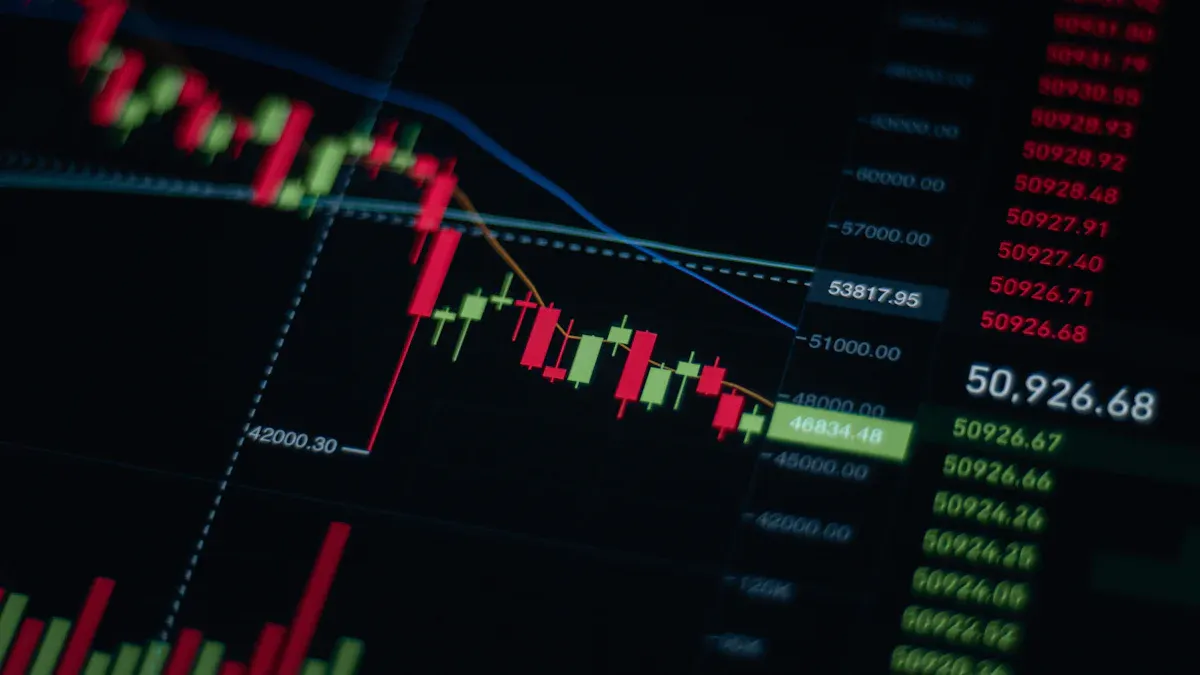- EasyCard
- Trade
- Help
- Announcement
- Academy
- SWIFT Code
- Iban Number
- Referral
- Customer Service
- Blog
- Creator
Hang Seng Bank Real-Time Quotes and Latest Transaction Information

Image Source: pexels
You can instantly grasp the latest transaction information for Hang Seng Bank (0011.HK) at the Hong Kong Stock Exchange. Currently, Hang Seng’s stock price is approximately $14.60 to $14.65 (calculated at 1 USD = 7.85 HKD), with trading volume continuing to rise. When you query data, please note that some platforms may have a 15-minute delay. The official website and mainstream financial platforms provide authoritative information to help you stay in tune with market trends.
Key Points
- You can instantly check the latest stock price and transaction information through Hang Seng Bank’s official website and mainstream financial platforms, noting that some platforms’ data may be delayed by 15 minutes.
- Trading volume and bid-ask spread information reflect market activity, and mastering these data helps you judge short-term price trends and entry timing.
- Using real-time trend charts to observe Hang Seng stock price fluctuations and setting price alerts can help you seize buying and selling opportunities, improving investment efficiency.
- Hang Seng Bank has a large market capitalization and stable dividend yield, making it suitable for investors seeking stable cash flow, with attractive dividend returns.
- Regularly monitor market news, financial reports, and peer comparisons, combined with technical indicators, to improve the accuracy of investment decisions and grasp key factors in stock price changes.
Hang Seng Stock Real-Time Quotes

Image Source: pexels
Latest Transaction Price
You can check the latest transaction price of Hang Seng Bank (0011.HK) at the Hong Kong Stock Exchange at any time. Currently, Hang Seng’s stock price is approximately between $14.60 and $14.65 (calculated at 1 USD = 7.85 HKD). This price fluctuates with market movements. Data you see on different platforms may have a 15-minute delay. If you want the most real-time Hang Seng stock price, you can check directly on Hang Seng Bank’s official website, Yahoo Finance, Investing.com, or Futu Niuniu and other mainstream platforms. These platforms display opening price, closing price, highest price, and lowest price, allowing you to fully grasp the latest status of Hang Seng’s stock price.
Trading Volume and Turnover
If you want to understand market activity, you can pay attention to Hang Seng Bank’s trading volume and turnover. Trading volume represents the number of shares bought and sold on the day, while turnover is the total value of all transactions. For example, when Hang Seng’s stock price is $14.60, if the trading volume reaches 1 million shares, the turnover would be $14.6 million. You can see these data on major financial websites. High trading volume indicates increased market attention to Hang Seng Bank’s stock. You can use this information to judge short-term price trends and market sentiment.
Bid-Ask Spread Information
When you check bid-ask spread information, you can see real-time buy and sell orders. The bid shows how many investors are willing to buy Hang Seng Bank stock at a certain price, while the ask shows how many people want to sell at a certain price. These data affect the real-time changes in Hang Seng’s stock price. For example, when the bid is larger than the ask, Hang Seng’s stock price is likely to rise. You can see detailed bid-ask spread distributions on platforms like Futu Niuniu and Investing.com. This information helps you judge the timing for entering or exiting the market.
Tip: When checking Hang Seng’s stock price, remember to note whether the quote is updated in real-time. Some platforms indicate “real-time” or “15-minute delay,” and you should rely on official or major financial websites to ensure accuracy.
Today’s Trend

Image Source: pexels
Hang Seng Stock Price Trend
You can observe today’s price changes of Hang Seng Bank (0011.HK) through real-time charts. Hang Seng’s stock price showed slight fluctuations after the market opened, reaching $14.62 early in the session, then hovering between $14.60 and $14.65. You will notice that when market news or trading volume increases, the volatility of Hang Seng’s stock price expands. You can use platforms like Yahoo Finance or Futu Niuniu to view real-time trend charts, which display price changes in minutes or hours.
Tip: You can set price alerts, and when Hang Seng’s stock price reaches your target, the platform will notify you instantly, facilitating your investment decisions.
Highest and Lowest Prices
Today, Hang Seng Bank’s highest price was $14.65, and the lowest was $14.60. You can refer to the table below for a quick overview of today’s key price points:
| Item | Price (USD) |
|---|---|
| Highest Price | 14.65 |
| Lowest Price | 14.60 |
You can also note the 52-week range, with Hang Seng Bank’s stock price ranging from 87.450 to 117.500 HKD over the past year (approximately $11.14 to $14.97, calculated at 1 USD = 7.85 HKD). This reflects significant volatility in Hang Seng’s stock price over the year, and you should be mindful of risks when investing.
Opening and Closing Prices
Hang Seng Bank’s opening price today was $14.62, and the closing price will depend on the latest transaction price at market close. You can check the final closing price on major financial websites after the market closes. There is sometimes a gap between the opening and closing prices, often related to market sentiment, news, or changes in the international financial environment. You should pay attention to these prices to help judge short-term trends in Hang Seng’s stock price.
Basic Information
Stock Code
When checking Hang Seng Bank’s stock, you can note that its stock code at the Hong Kong Stock Exchange is “0011.HK.” This code helps you quickly find real-time quotes and related information on major financial platforms. You only need to enter “0011.HK” in the search bar to instantly access the latest data.
Market Capitalization and EPS
If you want to understand Hang Seng Bank’s scale, you can refer to its market capitalization. Market capitalization is the total number of shares multiplied by the current stock price. With Hang Seng’s current price at approximately $14.60 (1 USD = 7.85 HKD), the market capitalization is about $280 billion. You can also note the earnings per share (EPS), an important indicator of a company’s profitability. Hang Seng Bank’s EPS over the past year was approximately $1.50. You can use these data to assess Hang Seng Bank’s financial strength and investment value.
| Item | Value (USD) |
|---|---|
| Market Capitalization | Approx. 280 billion |
| EPS | Approx. 1.50 |
Tip: When comparing different banks, you can refer to both market capitalization and EPS to understand their scale and profitability.
Dividend Information
If you focus on stable income, Hang Seng Bank’s dividend performance is worth noting. In recent years, the Hang Seng High Dividend Yield 30 Index ETF has had an average dividend yield of about 7.41% since the start of 2025. This level is higher than the annualized dividend yield of the overall Hong Kong market, indicating that Hang Seng Bank’s dividend returns are stable and attractive. You can refer to the following key points:
- Hang Seng Bank’s dividend yield has consistently exceeded the market average over the past five years, making it suitable for investors seeking stable cash flow.
- Since this year, Hong Kong bank dividend yields have remained stable with low valuations, attracting many institutional investors for long-term holdings.
- Macroeconomic recovery and loose monetary policies have helped stabilize bank performance, further strengthening dividend stability.
- The Hang Seng High Dividend Yield 30 Index ETF is Hong Kong’s first monthly dividend ETF, suitable for retirees or those seeking passive income.
- The monthly dividend feature helps enhance the defensive strength of your investment portfolio, allowing you to achieve stable returns in volatile market conditions.
You can use this information to analyze Hang Seng Bank’s dividend advantages and make more informed investment decisions.
Change Analysis and Peer Comparison
Factors Affecting Stock Price Changes
If you want to understand why Hang Seng Bank’s stock price fluctuates, you can start with several key factors. First, market announcements directly impact Hang Seng’s stock price. For example, when Hang Seng Bank’s stock price announces quarterly financial reports, if earnings exceed expectations, the stock price usually rises. Conversely, if there is negative news or unfavorable economic data, Hang Seng’s stock price may fall. Analyst ratings are also important. When major investment banks upgrade Hang Seng Bank’s rating, market confidence increases, and the stock price may rise. You should also pay attention to the macroeconomic environment, such as interest rate changes and policy adjustments, which affect the overall performance of the banking sector.
Tip: You can regularly monitor Hang Seng Bank’s announcements and financial news to stay updated on key information affecting the stock price early.
Peer Comparison
When comparing Hang Seng Bank with other Hong Kong banks, you can start with metrics like real-time quotes, market capitalization, trading volume, and dividend yield. Below is a simple table of real-time data for three major Hong Kong banks (in USD, calculated at USD = 7.85 HKD):
| Bank | Latest Share Price (USD) | Market Capitalization(Billion USD) | Dividend Yield (%) | Volume (Million Shares) |
|---|---|---|---|---|
| Hang Seng Bank | 14.62 | 2800 | 7.41 | 100 |
| HSBC Hong Kong | 8.20 | 1600 | 6.80 | 150 |
| Bank of China | 3.90 | 1200 | 6.50 | 120 |
You can see that Hang Seng Bank’s dividend yield and market capitalization are relatively higher. Trading volume reflects market activity, and when it increases, stock price volatility also rises. You can use this data for technical analysis, such as observing price movements and volume changes, to help you decide the timing for buying or selling.
Tip: You can combine real-time quotes with technical indicators to improve the accuracy of your trading decisions.
As an investor, you should always stay updated on Hang Seng’s real-time quotes and transaction information. These data can help you understand market dynamics and make timely judgments. You can frequently check information on platforms like Hang Seng Bank’s official website, Yahoo Finance, and other financial platforms. Please remember these points:
-
- Quotes may be delayed by 15 minutes.
-
- During high market volatility, risks also increase.
Tip: You should regularly monitor market updates and technical indicators to improve the accuracy of your trading decisions.
FAQ
Are Hang Seng’s real-time quotes delayed?
When you check Hang Seng’s real-time stock quotes on most free platforms, the data is delayed by about 15 minutes. If you want truly real-time quotes, you can consider using paid services or official platforms.
Which platforms can I use to check Hang Seng Bank’s real-time share price?
You can check Hang Seng Bank’s (0011.HK) real-time stock price on platforms like Hang Seng Bank’s official website, Yahoo Finance, Investing.com, and Futu Niuniu. These platforms provide fast updates with authoritative data.
How to calculate Hang Seng Bank’s market capitalization?
You only need to multiply the current share price (in USD) by the total number of shares outstanding. For example, with a share price of $14.60 and approximately 1.9 billion USD shares, the market capitalization is about $27.74 billion USD (calculated at 1 USD = 7.85 USD).
Is Hang Seng Bank’s dividend yield high?
You can see that Hang Seng Bank’s recent dividend yield is about 7.41%. This level is higher than most Hong Kong banks, making it suitable for you if you’re pursuing stable income.
How does trading volume affect the share price?
When you notice high trading volume, it indicates active market buying and selling, increasing the stock price volatility. You can use trading volume to analyze short-term trends and help make investment decisions.
Hang Seng Bank (0011.HK), with a 7.41% dividend yield and robust market cap (approx. $280 billion), appeals to cash flow-focused investors, but 15-minute quote delays and cross-border investment barriers may limit global wealth opportunities—how can you achieve real-time, cost-effective wealth management? BiyaPay offers an all-in-one financial platform, enabling seamless trading of US and Hong Kong stocks without offshore accounts, extending Hang Seng’s stable returns to global markets, including giants like Tencent and Alibaba.
Supporting USD, HKD, and 30+ fiat and digital currencies, real-time exchange rate tracking ensures cost transparency, while global remittances to 190+ countries feature transfer fees as low as 0.5%, significantly below traditional bank cross-border costs, with swift delivery to meet global investment needs. A 5.48% annualized yield savings product, with no lock-in period, balances market volatility with steady returns. Sign up for BiyaPay today to integrate Hang Seng’s high-yield dividend strategy with BiyaPay’s worldwide financial solutions, creating an efficient, flexible wealth management experience!
*This article is provided for general information purposes and does not constitute legal, tax or other professional advice from BiyaPay or its subsidiaries and its affiliates, and it is not intended as a substitute for obtaining advice from a financial advisor or any other professional.
We make no representations, warranties or warranties, express or implied, as to the accuracy, completeness or timeliness of the contents of this publication.




Contact Us
Company and Team
BiyaPay Products
Customer Services
is a broker-dealer registered with the U.S. Securities and Exchange Commission (SEC) (No.: 802-127417), member of the Financial Industry Regulatory Authority (FINRA) (CRD: 325027), member of the Securities Investor Protection Corporation (SIPC), and regulated by FINRA and SEC.
registered with the US Financial Crimes Enforcement Network (FinCEN), as a Money Services Business (MSB), registration number: 31000218637349, and regulated by FinCEN.
registered as Financial Service Provider (FSP number: FSP1007221) in New Zealand, and is a member of the Financial Dispute Resolution Scheme, a New Zealand independent dispute resolution service provider.



















